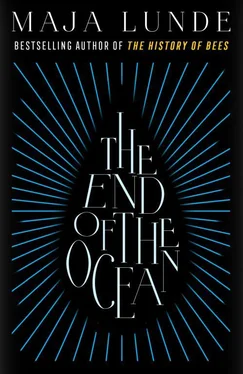“You’re in such a hurry,” Jeanette said. “Try not to be.”
“But it’s been almost a month!”
I took a deep breath, was about to say something else. But her mouth curled into a grimace and that stopped me. Not that she was mocking me, she just pulled her lips apart, like a smile but without any joy. A grin.
She could have sighed, probably had every reason to sigh. Sitting here all day long with people like me—who thought we were the only ones who mattered.
“Sorry,” I said.
“It’s fine,” she said.
But I wasn’t convinced that she really meant it. Because nothing was really fine . For any of us. Not for her. Not for Lou and me. And I should just get out of here, stop pressuring her, pestering, hassling her.
“But I can’t help it,” I said quickly.
“What?”
“I can’t help pestering you. I’m sorry.”
“Come back tomorrow,” Jeanette said.
*
“Everyone wants to get inside,” Lou said.
We were on our way to the boat and the only ones walking in that direction, walking out of the camp. At least twenty people were standing in front of the entrance to the camp and waiting to be registered. People who wanted to get inside . I hadn’t seen so many people there before. So many, so dirty, so tired. And some with soot marks on their faces.
Where were they going to live, all of them?
I wanted to hurry away from the camp, taking Lou with me. But I couldn’t help noticing three young men who were standing at the front of the line. There was something rough about them, something guarded. They had been on the road a long time, were used to sleeping with one eye open, used to having to watch over their things, take care of themselves, listen for footsteps, look over their shoulder. They spoke quickly. Laughed a little too loudly, the way you laugh when you want everyone to hear how much fun you are having. Like waiting in line to enter a nightclub, the way Edouard and I had done, once upon a time.
Suddenly one of them spun around to face the man behind them in the line and he spoke loudly to him in Spanish. The man was in his forties. Thick-necked, heavyset, his skin sun-beaten. He took a threatening step towards the young men. And said something, also in Spanish, in an even louder voice.
The two friends approached him. One of them pointed at his buddy’s bag, gesturing—it seemed like they were saying that Thick-Neck had tried to help himself from it.
The words began to fly rapidly back and forth between them. Their voices rose. Almost to screams. They stood close to one another. The three young boys on the one side, the adult and another man, who clearly was taking his side, on the other.
I could make out a few words that I understood, idiot , bastard .
Thick-Neck slapped his forehead with his hand.
At the same time he moved one step closer. Everyone in the line noticed them and had stopped talking. The woman sitting at the registration table was completely silent. Lou pressed up against me.
“What are they doing?” she whispered.
The young boy looked at Thick-Neck and then at the camp entrance. One of his buddies put his hand on his arm, restraining him, take it easy .
Finally the young boy took a deep breath, nodded quickly.
“OK, OK.”
He turned to the woman at the registration table, attempting a smile as he spoke in broken English: “Can we go in now?”
She didn’t answer. She could maybe have said something, about how troublemakers were not welcome in the camp. But it probably didn’t make any difference. Those who want to make trouble will do so, no matter what, whether they are allowed to enter or not. Sometimes it’s best just to be nice to them.
Hurriedly, I led Lou away, down the road. I had seen things like this before, brawls in food lines, in bars in the evening.
I knew what it was about and that it wouldn’t pass anytime soon. They would keep it up for a long time, these men, because it was always men. They would keep it up until their fists hardened. Till they had hit everything they could find that was soft, throwing punches that landed with hollow thuds. Muscles, bones, flesh and organs. Strange moans a split second after the blow, when the body absorbed what had happened, as the nervous system did its job.
Their frustration was intensified by the heat, the heat that never relented, not even during the night. There is nothing that makes people more aggressive than not being able to sleep because of the heat.
The heat did something to the air. Like a gas, we inhaled it without noticing it. Like fungal spores. We absorbed them through our respiratory passages. They were growing inside of us. The fungi grew large and gray. Shiny on top, layers of supple frills under the cap. Poisonous. They spread through us. Altered our nerve impulses, took control of the brain.
But this wasn’t my fight, not my conflict. Spain was not my country.
I had Lou. The only thing I could do was leave.
Nonetheless, my feet were dragging. Because hadn’t Thick-Neck stuck his hand into the young boy’s bag? Hadn’t I seen that, really? Shouldn’t I have supported them? Sided with them?
I should have. And I wanted to. Show my solidarity with them. Choosing sides means being inside.
“You are walking so slowly.” Lou was pulling me.
And I quickened my pace, walking faster, even though I felt I had shrunk. I was convinced that they were staring at us, everyone in the line, that they saw how small we were, what outsiders we were.
He who doesn’t choose sides is damn lonely.
*
Lou followed the right route, the third lane to the left. The gardens were deserted today, the shutters were closed. All the houses looked empty.
As we walked along Lou’s steps became lighter. She was looking forward to this. Soon she started chattering. She talked more than she had in a long time, about the boat, about the dolphins. I listened only in part. But then she started asking questions.
“Daddy. Where is there the most water?”
I didn’t answer right away. Couldn’t bring myself to talk now.
“Daddy? Where is the most water? In the world or in the oceans?”
“The oceans are also a part of the world,” I said.
“And is it water when it’s salty?”
“Yes, it’s still water.”
“Are there oceans that aren’t salty?”
“Do you remember when we went up into the mountains?” I asked.
“The mountains?”
“Do you remember you swam in a lake up there?”
“In my yellow bathing suit?”
“Yes.”
“I went swimming in the yellow bathing suit even though it was too small for me.”
“That was the time, yes.”
“But it wasn’t too small. I was the one who had grown too big.”
“Yes… The water you went swimming in then, it wasn’t salty.”
“Did we drink it?”
“No, but we could have drunk it.”
“Why didn’t we drink it?”
“I don’t know. I imagine because we’d brought bottled water.”
“Why?”
“Well…”
“Daddy, can we go there? To the lake?”
“It’s no longer possible.”
“Why not?”
“You know why.”
“The drought?”
“Yes.”
“And there’s no lake like that here without salt? Fresh water?”
“No. Maybe there were lakes here. But now they’ve dried up.”
“Too bad.”
“Yes.”
“How many freshwater lakes are there?”
“A lot.”
“More than ten?”
“More than ten.”
“More than a hundred?”
“More than a million. There are even lakes under the ground.”
“Under the ground? That we walk on?”
“Yes.”
Читать дальше










